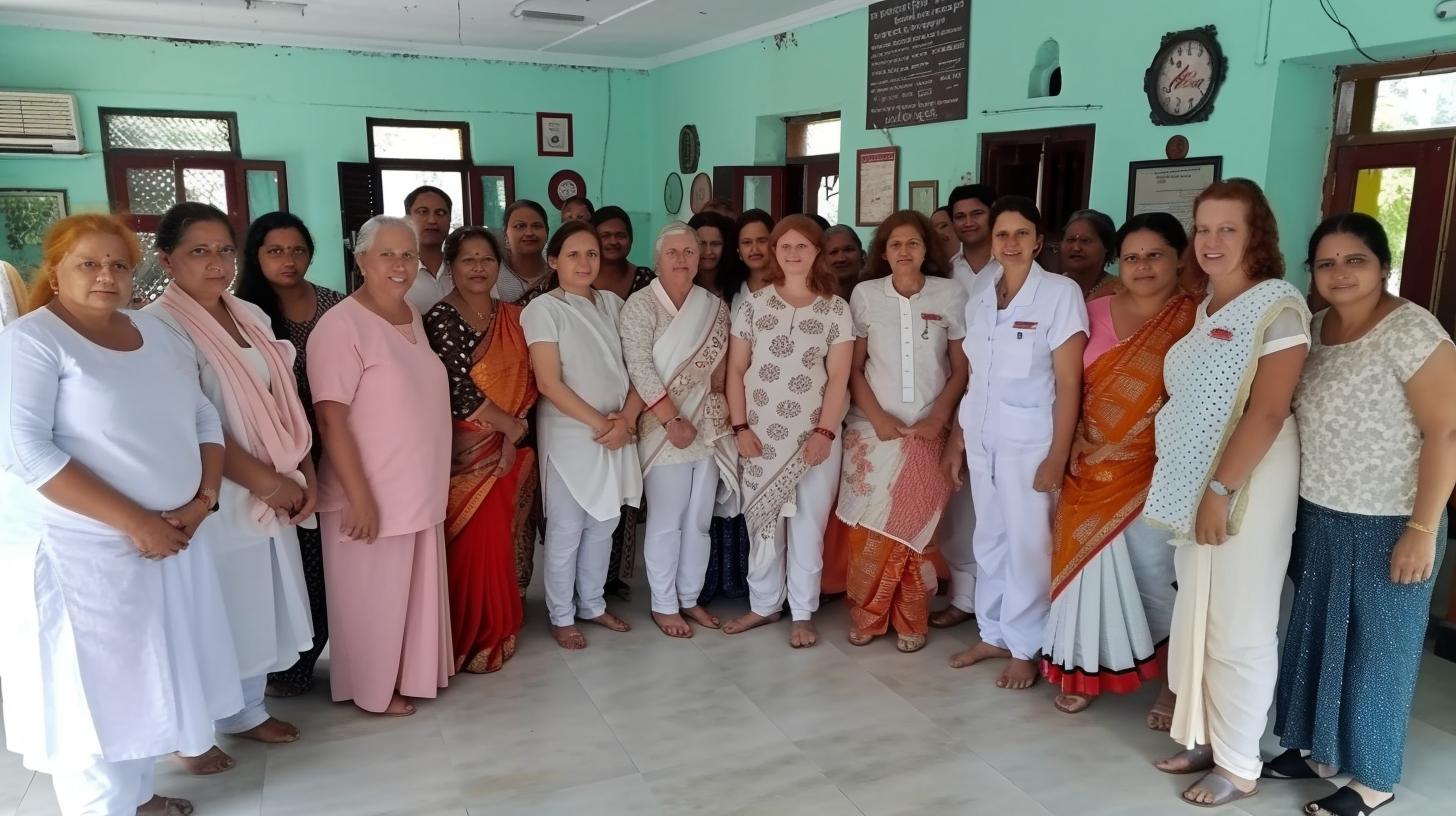
Community health nursing is a crucial component of the GNM 1st Year curriculum, providing students with the knowledge and skills to care for individuals, families, and communities. In this article, we will explore the role of a community health nurse, the importance of community health nursing in GNM 1st Year education, core skills and competencies required for this field, as well as the challenges and rewards that come with it.
As community health nurses, GNM 1st Year students will learn how to provide essential healthcare services to diverse populations, focusing on health promotion, disease prevention, and improving overall quality of life. Understanding the specific role of a community health nurse is vital in addressing the unique needs of various communities and implementing effective interventions.
Through case studies and real-life scenarios, students will have the opportunity to gain practical experience in managing community health issues. They will also be equipped with intervention strategies to address these challenges while promoting preventative care initiatives within their respective communities. This education lays a solid foundation for their future careers in community health nursing.
The Importance of Community Health Nursing in GNM 1st Year Curriculum
Community health nursing plays a crucial role in the curriculum of GNM 1st year students. It provides them with the necessary skills and knowledge to effectively care for individuals, families, and communities in a holistic manner. Here are the reasons why community health nursing is of utmost importance in the GNM 1st year curriculum:
- Exposure to diverse healthcare settings: Community health nursing exposes GNM 1st year students to various healthcare settings such as rural communities, urban areas, and marginalized populations. This exposure helps students understand the different healthcare needs of diverse communities and develop cultural competence.
- Emphasis on preventative care: Community health nursing places a strong emphasis on preventative care and health promotion. Students learn about the importance of disease prevention, immunization programs, family planning services, and other public health initiatives that are essential for maintaining community well-being.
- Practical application of nursing skills: GNM 1st year students gain hands-on experience in providing nursing care within the community. They learn how to conduct home visits, assess community needs, and implement interventions to improve overall community health.
Overall, community health nursing is an integral part of the GNM 1st year curriculum as it equips students with the necessary skills and knowledge to address the unique healthcare challenges faced by diverse communities. By understanding the importance of preventative care, developing cultural competence, and gaining practical experience in community settings, GNM 1st year students are well-prepared for their future role as community health nurses.
Core Skills and Competencies for Community Health Nursing
Community health nursing is a specialized field that requires a unique set of skills and competencies to effectively care for individuals, families, and communities. As a community health nurse, one must possess strong assessment skills to be able to identify the healthcare needs of the population. This includes being able to conduct thorough community assessments and analyze data to determine the prevalent health issues in a particular area.
In addition to assessment skills, community health nurses must also be proficient in communication and education. Being able to effectively communicate with diverse populations is crucial in providing education on preventative care, healthy lifestyle choices, and disease management. Nurses working in this field must also have the ability to develop culturally-sensitive interventions that are tailored to the specific needs of the community they serve.
Furthermore, critical thinking and problem-solving skills are essential for community health nurses. They must be able to analyze complex situations and make decisions that will have a positive impact on the overall health of the community. This includes being able to collaborate with other healthcare professionals, community organizations, and local government agencies to develop comprehensive strategies for improving public health outcomes.
| Skill/Competency | Description |
|---|---|
| Assessment | Ability to conduct community assessments and identify prevalent health issues. |
| Communication | Effective communication with diverse populations for education on preventative care. |
| Critical Thinking | Analyzing complex situations and making decisions for community interventions. |
Challenges and Rewards of Community Health Nursing in GNM 1st Year
Community health nursing in GNM 1st year education comes with its own set of challenges and rewards. One of the main challenges faced by community health nurses is the wide range of responsibilities they have to juggle, from providing direct patient care to conducting community assessments and advocating for policy changes. Additionally, the job can be physically and emotionally demanding, as community health nurses often work with underserved populations facing complex health issues.
On the other hand, there are also many rewards associated with community health nursing. One of the most significant rewards is the opportunity to make a tangible difference in people’s lives by promoting health and wellness within communities.
Community health nurses also have the chance to form strong and meaningful connections with their patients, which can be incredibly fulfilling. Furthermore, working in the field of community health nursing allows for a diverse and dynamic work environment, where every day brings new challenges and opportunities for growth.
Despite the challenges, a career in community health nursing can be highly rewarding for those who are passionate about making a positive impact on public health. By developing essential skills such as effective communication, cultural competence, and critical thinking, GNM 1st year students can prepare themselves for a fulfilling career in community health nursing.
| Challenges | Rewards |
|---|---|
| Wide range of responsibilities | Opportunity to make a tangible difference |
| Physically and emotionally demanding | Meaningful connections with patients |
| Advocating for policy changes | Diverse and dynamic work environment |
Community Health Nursing Case Studies and Real-Life Scenarios
Community health nursing in GNM 1st year education involves understanding the practical application of nursing skills in real-life scenarios. Case studies are an essential part of this training as they provide students with the opportunity to apply their theoretical knowledge to actual situations in the community. These case studies often focus on various health issues, including infectious diseases, maternal and child health, chronic illnesses, and mental health.

In these case studies, students are presented with a specific scenario and are required to assess the situation, identify health needs, plan and implement interventions, and evaluate the outcomes. This hands-on approach allows students to develop critical thinking skills and clinical judgment while learning how to address the unique challenges present in different community settings.
Real-life scenarios also play a crucial role in community health nursing education as they expose students to the diverse social determinants of health that impact individuals and communities. By engaging with these scenarios, students can gain a deeper understanding of how factors such as income, education, housing, and access to healthcare services influence overall well-being. It also provides an opportunity for students to develop cultural competence and sensitivity to the needs of diverse populations.
Overall, case studies and real-life scenarios are integral components of community health nursing education in GNM 1st year as they prepare students for the complexities of delivering care within the community. They empower future nurses to think critically, adapt to various environments, and advocate for the health needs of individuals and communities alike.
- Case studies involving infectious disease management
- Scenario-based learning for maternal and child health interventions
- Real-life examples of addressing mental health issues in the community
Promoting Health and Preventative Care in the Community
Understanding the Concepts of Health Promotion
As a community health nurse in GNM 1st year, it is vital to have a deep understanding of health promotion and its significance in preventing illnesses. Health promotion involves empowering individuals and communities to take control of their own health by making informed choices. This includes promoting healthy lifestyles, encouraging regular exercise, balanced diets, and providing education about the importance of preventative care.
Implementing Preventative Care Programs
One of the key roles of a community health nurse is to implement preventative care programs within the community. This can involve organizing vaccination campaigns, prenatal education classes, and regular health screenings for common diseases such as diabetes and hypertension. By working closely with community members, a community health nurse can identify specific needs and tailor preventative care programs accordingly.

Promoting Mental Health Awareness
In addition to physical health, GNM 1st year students learning about community health nursing also need to understand the importance of promoting mental health awareness in the community. This can include raising awareness about stress management, depression, and anxiety disorders. By providing resources and support for mental well-being, community health nurses can play a crucial role in preventing mental health issues from escalating within the community.
Through these efforts, GNM 1st year students specializing in community health nursing learn how to effectively promote health and preventative care within communities, ultimately contributing to improved overall well-being.
Community Health Nursing Interventions and Strategies
Implementing Health Education Programs
One of the key interventions in community health nursing is the implementation of health education programs. This involves educating individuals and communities about various health issues, promoting healthy behaviors, and providing information on disease prevention. Community health nurses play a crucial role in designing, implementing, and evaluating these programs to ensure that the needs of the community are met. By empowering individuals with knowledge and skills, community health nurses can make a significant impact on improving overall community health.
Collaborating With Local Healthcare Providers
Another important strategy in community health nursing is collaborating with local healthcare providers to ensure comprehensive care for the community. This involves working closely with physicians, social workers, public health officials, and other healthcare professionals to identify and address the unique healthcare needs of the community. By building strong partnerships and networks within the healthcare system, community health nurses can facilitate access to services, promote continuity of care, and improve overall health outcomes for individuals and families.
Advocating for Policy Change and Resource Allocation
Community health nurses also play a vital role in advocating for policy change and resource allocation to address systemic issues that affect community health. This may involve advocating for improved access to healthcare services, addressing social determinants of health, or promoting equitable distribution of resources within the community.
By participating in policy development and engaging in public advocacy efforts, community health nurses can influence change at both the local and national levels to create healthier environments for all members of the community.
By employing these interventions and strategies, community health nurses can make a lasting impact on improving the overall well-being of individuals and communities. Their dedication to promoting healthy behaviors, addressing healthcare needs, and advocating for policy change contributes significantly to the advancement of public health initiatives
Future of Community Health Nursing in GNM 1st Year Education and Career Opportunities
In conclusion, the future of community health nursing in GNM 1st year education and career opportunities looks bright and promising. As the healthcare industry continues to prioritize preventive and community-based care, the role of community health nurses will become even more essential. With a strong foundation in core skills and competencies, students in the GNM 1st year program can expect to be well-prepared for their future careers in this field.
The importance of community health nursing in the GNM 1st year curriculum cannot be understated. By understanding the role of a community health nurse and being equipped with the necessary knowledge and practical skills, students are being empowered to make a meaningful impact on the health and well-being of diverse communities. The challenges and rewards of community health nursing are also addressed, providing students with a realistic view of what to expect in their future careers.
As students engage with community health nursing case studies and real-life scenarios, they are able to apply their learning to actual situations they may encounter in practice. This hands-on approach is invaluable in preparing them for their future roles as community health nurses.
Furthermore, by promoting health and preventative care in the community through interventions and strategies, students are not only gaining valuable experience but also contributing to the overall well-being of the populations they serve. Overall, the future of community health nursing is promising for those pursuing a career in this field through GNM 1st year education.






